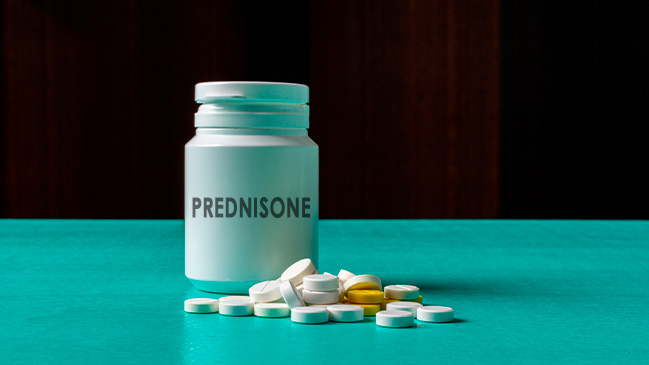Granulomatosis with polyangiitis (GPA) is a complex autoimmune disease that requires careful management to maintain remission and minimize relapses. A recent study presented at the 2024 Annual Meeting of the American College of Rheumatology (ACR) evaluated the effects of complete discontinuation of prednisone in these patients, revealing significant findings regarding the risk of relapses.
Key Study Findings
1. Increased Risk of Relapse with Discontinuation of Prednisone
Patients who completely stopped taking prednisone showed a 4-fold increased risk of relapse at 6 months compared to those who maintained a low dose of 5 mg daily. However, this increased risk was only evident in patients not receiving rituximab treatment.
2. Results Based on Concomitant Treatment
+ In patients treated with rituximab, there were no significant differences in relapse rates between those who stopped prednisone and those who maintained a low dose.
+ In those not receiving rituximab, the relapse risk was 9.5 times higher in the group without prednisone.
3. Characteristics of Relapses
+ Most relapses were mild and occurred continuously throughout the 6-month study period.
+ Musculoskeletal and otolaryngological manifestations were the most common.
4. Adverse Effects
+ Although the group without prednisone had more severe adverse events and infections (five severe adverse events and ten infections versus one adverse event and four infections in the low-dose group), these differences were not statistically significant.

Study Design
The “Assessment of Prednisone in Remission” (TAPIR) trial included 143 patients with GPA in remission for at least one year. Participants:
- Reduced their prednisone dose to 5 mg/day before the study started.
- Were randomized to continue 5 mg/day or to completely discontinue prednisone for 6 months.
All patients continued with an additional immunosuppressive treatment, such as methotrexate or azathioprine, during the study period.
Clinical Implications
Dr. Peter Merkel, the study leader and head of the Division of Rheumatology at the University of Pennsylvania, emphasized that it is reasonable to consider progressive tapering of glucocorticoids as an initial strategy, especially in patients treated with rituximab. However, he pointed out that complete discontinuation of prednisone carries a relatively low risk of severe relapses, which can be effectively treated.
Dr. Galina Marder, a rheumatologist and associate professor at the Donald and Barbara Zucker School of Medicine, applauded the findings, noting that the study reinforces the possibility of completely discontinuing steroids when clinically feasible.

Future Directions
These results open the door to:
- Designing clinical trials to assess the long-term effects of tapering or discontinuing glucocorticoids in patients with GPA.
- Optimizing personalized treatment strategies based on the use of rituximab and other immunosuppressive therapies.
The Vasculitis Clinical Research Consortium, funded by the US National Institutes of Health, supported this study. The findings underscore the importance of balancing disease control with the reduction of side effects associated with glucocorticoids.

Managing GPA requires a personalized approach. This study highlights that, although complete discontinuation of prednisone increases the risk of relapse, most relapses are mild and treatable. In patients treated with rituximab, maintaining or discontinuing prednisone does not significantly affect relapse rates, offering more flexibility in clinical management. These findings could guide future therapeutic strategies to improve outcomes in this complex disease.
Source:
https://espanol.medscape.com/verarticulo/5913274#vp_1

